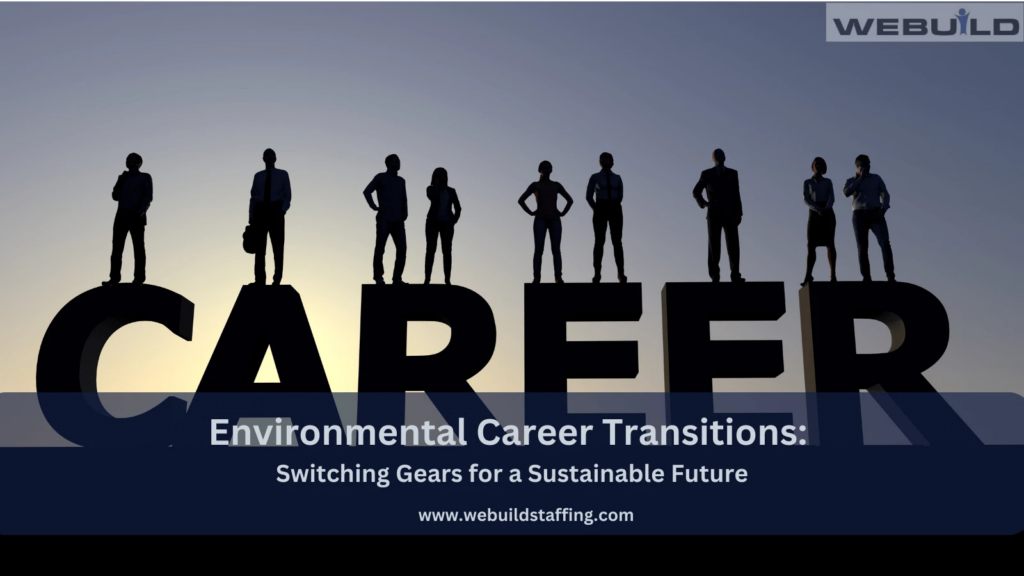In a world increasingly focused on sustainability and environmental responsibility, transitioning to an environmental career is a powerful choice. Whether you’re considering switching careers to align with your passion for the environment or seeking a new direction within the green industry, environmental career transitions offer the opportunity to contribute to a more sustainable future while finding fulfillment in your work. In this blog post, we will explore the intricacies of environmental career transitions, offering guidance and insights to help you successfully navigate this journey toward a greener and more sustainable career path.
Self-Assessment: Identifying Your Passions and Skills
Before embarking on an environmental career transition, take the time for introspection. Consider your passions, values, and skills. Ask yourself:
- What aspects of environmental sustainability resonate with me the most?
- What skills do I currently possess that are transferable to the green industry?
- What areas within the environmental field am I most interested in?
- Am I willing to pursue further education or certifications to enhance my qualifications?
By gaining clarity on your interests and skills, you can make informed choices about your career direction and identify areas of the green industry that align with your aspirations.
Research and Education: Closing Knowledge Gaps
Environmental careers often require specialized knowledge and expertise. Depending on your current background, you may need to bridge knowledge gaps to transition successfully. Consider the following steps:
- Research: Immerse yourself in environmental literature, news, and industry reports to stay current on environmental issues and trends.
- Enroll in Courses: Explore educational opportunities, such as courses, workshops, or online programs, that can provide you with the necessary skills and knowledge.
- Seek Certifications: Look into certifications specific to your area of interest, such as LEED (Leadership in Energy and Environmental Design) for sustainable building or PMP (Project Management Professional) for project management.
- Engage with Professional Organizations: Join environmental professional organizations that offer resources, networking, and educational opportunities.
Networking and Building Relationships
Networking is a powerful tool in any career transition, including environmental ones. Building relationships with professionals in the field can provide valuable insights and open doors to job opportunities. Here’s how to expand your network:
- Attend Events: Attend environmental conferences, workshops, and networking events to meet industry professionals.
- Online Networking: Utilize LinkedIn and other online platforms to connect with professionals in your chosen field.
- Informational Interviews: Request informational interviews with environmental experts to learn about their career paths and gather advice.
- Volunteer: Participate in environmental projects, local initiatives, or volunteer with environmental organizations to meet like-minded individuals.
- Mentorship: Seek out mentors who can guide you through your career transition and provide valuable advice and insights.
Building a Relevant Resume and Portfolio
Your resume and portfolio are essential tools for showcasing your qualifications and experiences in the environmental field. Tailor your resume to highlight transferable skills and relevant experiences. If you lack direct experience, emphasize your passion for sustainability and willingness to learn. Consider the following tips:
- Include Relevant Coursework: If you’ve taken courses or earned certifications related to your desired environmental field, include them on your resume.
- Highlight Transferable Skills: Emphasize skills that are applicable to the green industry, such as project management, data analysis, research, or communication.
- Showcase Volunteer Work: Include any volunteer work or environmental projects you’ve participated in, even if they were not paid positions.
- Quantify Achievements: Use numbers and metrics to quantify your accomplishments, demonstrating your impact in previous roles.
- Tailor Your Cover Letter: Customize your cover letter for each job application, emphasizing your enthusiasm for the specific position and organization.
Finding Entry Points: Start Small If Necessary
It’s common for career transitioners to start with entry-level positions to gain experience in their new field. Be open to starting small and working your way up. Here are some ways to find entry points:
- Internships: Consider environmental internships or volunteer positions to gain hands-on experience.
- Entry-Level Jobs: Look for entry-level roles in environmental organizations, agencies, or companies to build a foundation in your chosen field.
- Freelancing or Consulting: Offer your expertise as a freelancer or consultant to gain experience and build a portfolio.
- Nonprofits and NGOs: Nonprofit organizations often have entry-level positions and are dedicated to environmental causes.
- Government Agencies: Explore opportunities with government agencies involved in environmental regulation and policy.
Transitioning Smoothly: Handling Challenges and Resilience
Environmental career transitions can be challenging, but resilience and adaptability are key to success:
- Stay Informed: Continuously educate yourself about industry developments and trends to remain competitive.
- Seek Feedback: Be open to feedback from mentors, peers, and supervisors to refine your skills and performance.
- Embrace Learning Opportunities: View challenges as learning experiences and opportunities for growth.
- Patience: Recognize that career transitions take time, and be patient with yourself as you progress.
- Networking: Continue to network and build relationships throughout your career to access opportunities and support.
Pursuing Your Passion: Nurturing a Fulfilling Career
Transitioning to an environmental career is not just about finding a job; it’s about pursuing your passion and contributing to a sustainable future. As you advance in your new career, stay committed to your environmental values and continue to seek opportunities to make a positive impact. Your dedication to sustainability can be a driving force in your career journey.
Transitioning to an environmental career offers the chance to align your professional life with your passion for sustainability. By conducting self-assessment, acquiring relevant knowledge, building a network, crafting a strong resume, and embracing opportunities, you can successfully navigate a career switch and contribute to a more sustainable future. Remember that every step you take toward an environmental career is a meaningful one, both for your personal fulfillment and the well-being of our planet.
Webuild Staffing Agency is a leading executive search and staffing agency dedicated to the construction, engineering and environmental industries. To learn more please visit: www.webuildstaffing.com


